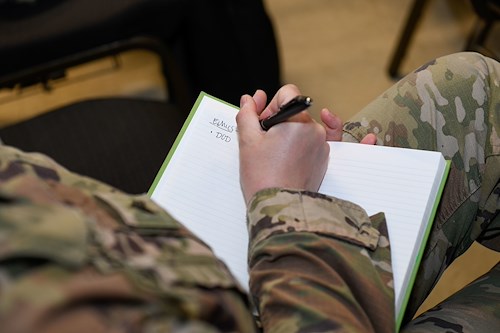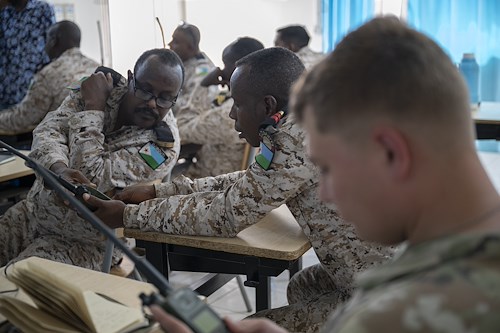Gallery contains 3 images
×
Photo 1 of 3
Combined Joint Task Force - Horn
U.S. Army Sgt. Hannah Bodenbach, Combined Joint Task Force-Horn of Africa surgeon cell preventative medicine technician, takes notes during the Military Tropical Medicine Course at Camp Lemonnier, Djibouti, March 1, 2022. The course brought together joint and allied partners for tropical medical education. The course was designed to educate and train physicians, mid-level practitioners, nurses, medics and all other allied health professionals. (U.S. Army photo by Spc. Kiersten Breunig)
Photo by: Spc. Kiersten Breunig
Photo 2 of 3
Combined Joint Task Force - Horn
Participants of the Military Tropical Medicine Course observe a presentation at Camp Lemonnier, Djibouti, March 1, 2022. The course brought together joint and allied partners for tropical medical education. The course was designed to educate and train physicians, mid-level practitioners, nurses, medics and all other allied health. (U.S. Army photo by Spc. Kiersten Breunig)
Photo by: Spc. Kiersten Breunig
Photo 3 of 3
Combined Joint Task Force - Horn
A French medical professional attends the Military Tropical Medicine Course at Camp Lemonnier, Djibouti, March 1, 2022. The course brought together joint and allied partners for tropical medical education. The course was designed to educate and train physicians, mid-level practitioners, nurses, medics and all other allied health. (U.S. Army photo by Spc. Kiersten Breunig)
Photo by: Spc. Kiersten Breunig
The Combined Joint Task Force- Horn of Africa surgeon cell hosted partners and other U.S. military medical professionals during a Military Tropical Medicine Course (MTMC) here March 1-3, 2022. The course provided participants with the most recent knowledge and skills to address infectious and communicable diseases commonly found in East Africa.
“Djibouti is a great example of an austere environment with a lot of different infectious diseases that we don’t see in the United States,” said U.S. Navy Capt. Todd Gleeson, director of the MTMC, as well as the attending physician of infectious diseases at Walter Reed National Military Medical Center. “It’s really important for our healthcare providers to be able to recognize what those are and how to treat them.”
Equipped with this knowledge, medical providers are optimally prepared to protect the health of U.S. forces and civilians in the region. “All of the material we’re being taught directly relates to force health protection, health service support and global health engagement,” said U.S. Army Col. Jayson Coble, CJTF-HOA surgeon cell director. “[The course] provided foundational knowledge of emerging technologies and some of the newest diagnostic tools we have available in the DoD for recognition, diagnosis and treatment of these unique diseases.”
The DoD supports the World Health Organization’s (WHO) goal of eliminating communicable diseases prevalent in East Africa and the greater continent.
“This is the most momentous decade of infectious diseases… 2020 to 2030 is a decade of major targeted approaches to eliminate a lot of infectious diseases in Africa,” said Gleeson. “The World Health Organization has a lot of goals to eradicate or eliminate certain infectious diseases in Africa and elsewhere in the developing world.”
Malaria continues to plague areas of Africa. According to the United Nations Children’s Fund, there were 229 million malaria cases globally in 2019 that led to 409,000 deaths.
“In 2021, the WHO deployed the first ever malaria vaccine in Sub-Saharan Africa in children,” said Gleeson. “We are working here in Djibouti during this historic time that Africa is going to start immunizing their children. It gets after malaria, which has been a scourge to humankind for centuries. It’s amazing to work in Africa during this time.”
Another disease impacting the East African region is guinea worm. According to Gleeson, through efforts of the WHO, the disease is expected to be completely eradicated from the continent, eliminating a centuries-old illness.
“We are training other doctors and local nationals as well, although we’re not specifically seeing patients,” Gleeson added. “Right now, we do have doctors from France, Italy and Spain who are also deployed to this area, their local institutions, and we also have some providers from Djibouti itself. We’re learning from them at the same time as we’re training them with what they see in Djibouti. Whenever we do these things overseas, it’s always cool to work with the local providers to see a mutual exchange of information. Then we get to discuss how we do it in the United States and have that collaborative exchange.”
The MTMC is just one example of how the surgeon cell, as part of CJTF-HOA, preserves health of the force within the command’s area of interest while providing guidance to commanders and the joint services throughout the task force. Additionally, the surgeon cell provides command, control and coordination of all CJTF-HOA medical assets. U.S. Army Cpl. Karly Simmons, CJTF-HOA surgeon cell administrator, added that each subsection of the surgeon cell has the opportunity to cross train with other medical fields to better their skills and broaden their capabilities as medical professionals.
Headquartered at Camp Lemonnier, Djibouti, CJTF-HOA is located on the only permanent U.S. military installation on the African continent. As a dynamic operational headquarters, CJTF-HOA ensures a strategic partnership with Djibouti and partners, nations, coalition forces and interagency and intergovernmental organizations to achieve a unified effort. According to Gleeson, it is essential to continue this collaboration with the Djiboutians in order to achieve the eradication of these centuries old diseases.













